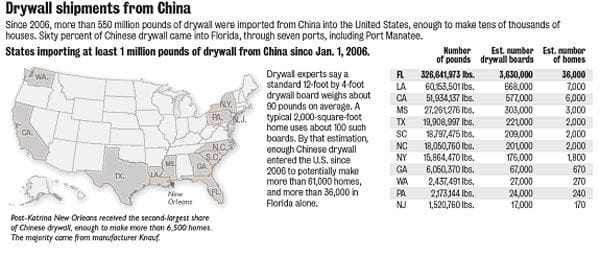Sulfur Byproduct from Chinese Drywall Damages Homes, Causes Health Problems
June 2, 2009 — Consumers that purchased new homes in south Florida thought they were moving into the home of their dreams. Unfortunately for some, their dream homes quickly became nightmares as the walls started off-gassing sulfur, wreaking havoc and causing premature failure of appliances, corroding wiring, and leaving homes smelling like rotten eggs. Otherwise healthy people began to develop a host of respiratory ailments that could be linked to the corrosive nature of sulfur gas. As it turned out, the walls were built using drywall imported from China.
In the environments of southern states like Florida and Louisiana, tests have shown the imported Chinese drywall emits sulfur gases when exposed to humidity and heat. Homeowners across Florida, where an estimated half of the imported drywall was used, have dealt with the rotten egg smell and corrosive environment created by the sulfur gas byproduct of Chinese drywall. Drywall imported from China has been found to contain high concentrations of multiple sulfur compounds and above-average levels of strontium. While an official link to health complications has not been established, homeowners and their families have gone from being perfectly healthy to ongoing battles with headaches, nosebleeds, and upper respiratory troubles. In addition to health complications, the corrosive gas attacks and decays copper components within the home, leading to problems with wiring, switches, air conditioning systems, and other electrical items like televisions, computers, DVD players, or anything with exposed copper circuits.
Side Effects Reported, but Not Classified as Hazard
Despite reports of health complications, Henry Slack, indoor air program manager for the U.S. Environmental Protection Agency’s Region 4 office in Atlanta, said, “there is no documentation that imported Chinese drywall is an environmental hazard, a human health hazard or is threatening water supplies.” The Florida Department of Health and Consumer Product Safety Commission is also testing for potential health hazards or complications. No official statement has been made at this time. Released on May 19th, the official EPA analysis of the Chinese drywall shows concentrations of sulfur not found in U.S. samples, as well as significantly greater concentrations of strontium.
Imported Drywall Problems Lead to Lawsuits
More than sixty percent of imported Chinese drywall that entered the U.S. came through Florida. Based on square foot estimates, enough contaminated drywall was unloaded in Florida to build more than half the homes estimated to contain Chinese drywall. Suits filed in Florida are targeting construction companies and drywall manufacturers including German drywall manufacturer Knauf, its Chinese subsidiaries, and Chinese manufacturer Taishan Gypsum. Homeowners allege that the tainted drywall has corroded air conditioning and refrigerator coils, microwaves, computer wiring, faucets, and copper tubing. The class-action lawsuit against Knauf has a filing deadline of December 9, 2009. See Knauf class-action lawsuit for more information.

Miami-based homebuilder Lennar Corp, one of eight construction companies currently being sued, is also suing the U.S. suppliers from which it purchased the Chinese drywall. Tests paid for by Lennar say the drywall appears to emit sulfur gases that can damage air conditioning coils, electrical plumbing components and other material. Lennar is making an effort to confront the problem with its customers–initiating a program to do inspections and remove the offending wallboard in many homes.
Protecting the Legal Rights of Consumers
Unfortunately, as the use of substandard products continues to increase, consumers are at unnecessary risk of preventable health complications and injuries. Brayton Purcell has over 25 years of experience protecting the rights of consumers and holding those accountable for unnecessarily putting the health and safety of the general public at risk. If your home exhibits the symptoms of contaminated Chinese drywall, we encourage you to contact a Chinese drywall attorney and discuss your legal options for having your home repaired.














